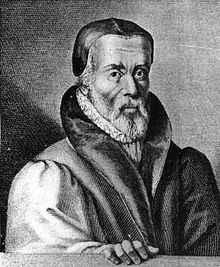William Tyndale
| William Tyndale | |
|---|---|
 |
|
| Born |
c. 1494 Gloucestershire, England |
| Died |
c. 6 October 1536 near Vilvoorde, Duchy of Brabant, Seventeen Provinces |
| Cause of death | Executed by strangling, then burnt at the stake |
| Alma mater | Magdalen Hall, University of Oxford |
| Known for | Tyndale Bible |
William Tyndale (/ˈtɪndəl/; sometimes spelled Tynsdale, Tindall, Tindill, Tyndall; c. 1494–1536) was an English scholar who became a leading figure in Protestant reform in the years leading up to his execution. He is well known for his translation of the Bible into English. He was influenced by the work of Desiderius Erasmus, who made the Greek New Testament available in Europe, and by Martin Luther. A number of partial translations had been made from the seventh century onward, but the spread of Wycliffe's Bible resulted in a death sentence for any unlicensed possession of Scripture in English—even though translations had been accomplished and made available in all other major European languages.
Tyndale's translation was the first English Bible to draw directly from Hebrew and Greek texts, the first English one to take advantage of the printing press, and first of the new English Bibles of the Reformation. It was taken to be a direct challenge to the hegemony of both the Roman Catholic Church and the laws of England maintaining the church's position. In 1530, Tyndale also wrote The Practyse of Prelates, opposing Henry VIII's annulment from Catherine of Aragon on the grounds that it contravened Scripture.
Reuchlin's Hebrew grammar was published in 1506. Tyndale worked in an age in which Greek was available to the European scholarly community for the first time in centuries. Erasmus compiled and edited Greek Scriptures following the Fall of Constantinople in 1453. Constantinople's fall helped to fuel the Renaissance and led to the dispersion of Greek-speaking intellectuals and texts into a Europe which previously had no access to them. A copy of The Obedience of a Christian Man fell into the hands of Henry VIII, providing the king with the rationale to break the Church in England from the Roman Catholic Church in 1534.
...
Wikipedia
